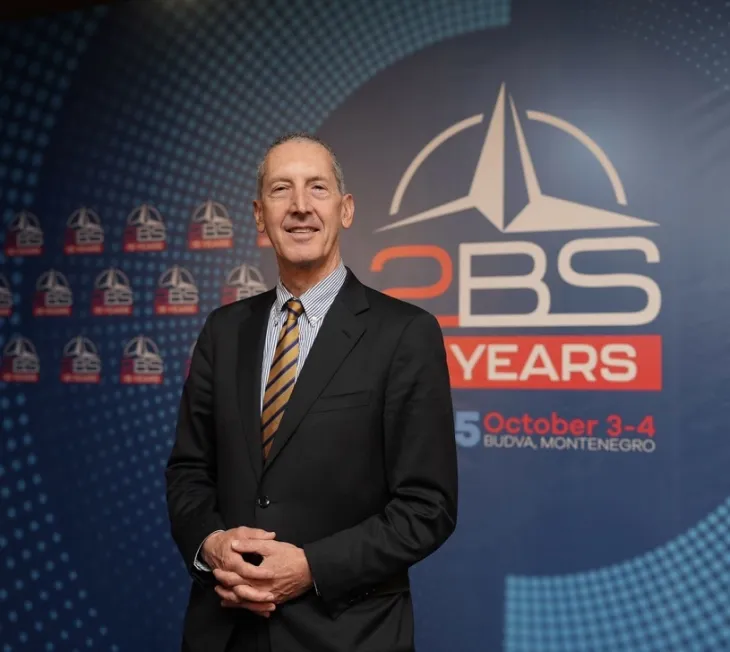Lifestyle
EU’s Role in Western Balkans Examined by Edward P. Joseph

The European Union (EU) must assume responsibility for the situation in the Western Balkans if it is to maintain its influence on the international stage, according to Edward P. Joseph, a lecturer at the Johns Hopkins School of Advanced International Studies. In an interview with the MINA agency during the 2BS Forum held in Budva, Joseph emphasized the significance of Montenegro’s potential EU membership for both the country and the union itself. He noted that the primary responsibility lies with Montenegro to implement reforms, enhance political culture, and demonstrate unity.
Joseph highlighted the EU’s crucial role in addressing crises beyond its borders, particularly the ongoing conflict in Ukraine, which is exacerbated by Russian aggression. He pointed out that the EU has historically relied on the United States for solutions, stating, “The reality is that in that part, the EU depends on the United States.” Nevertheless, he argued that the EU should exhibit strength in the Balkans, aligning with expectations set by the administration of former U.S. President Donald Trump.
The lecturer criticized the EU for not prioritizing the Western Balkans adequately, calling it a significant oversight. He argued that the Balkans are an integral part of Europe, and thus, the EU bears a primary responsibility for the region’s stability. Joseph expressed concern over an overreliance on the U.S. to resolve pressing crises, referencing the Dayton Agreement for Bosnia and Herzegovina as a prime example.
Joseph also addressed the recent mass protests in Serbia, viewing them as a reflection of governmental accountability to citizens, which he identified as a fundamental European value. He stated, “The EU is failing this test,” urging the union to send a clear message to Belgrade against the arrest and mistreatment of citizens. He criticized the EU for sending mixed signals regarding its stance on the situation.
In discussing Montenegro’s EU membership, Joseph described it as an essential step for both the country and the union. He believes that while the EU is likely to accept Montenegro, political maneuvering could impact the timeline. He emphasized, “The greatest responsibility is on Montenegro itself,” urging the country to undertake necessary reforms and present a united front.
Joseph also commented on Serbia’s influence over Montenegro, particularly under President Aleksandar Vučić. He argued that while it is in Serbia’s interest for Montenegro to join the EU, Vučić perceives this accession as a threat, likening it to Russian President Vladimir Putin’s view of Ukraine’s EU aspirations. Joseph asserted that if the Serbian government were genuinely oriented towards the West, it would view Montenegro’s EU membership as a positive development.
Joseph’s analysis raises questions about the EU’s effectiveness and commitment to the Western Balkans. He concluded that the region represents a significant opportunity for the EU to assert its influence and credibility as a global player. As the dynamics in the Western Balkans continue to evolve, the EU’s actions and decisions will likely have lasting implications for the region’s stability and integration into the European fold.
-

 Health3 months ago
Health3 months agoNeurologist Warns Excessive Use of Supplements Can Harm Brain
-

 Health3 months ago
Health3 months agoFiona Phillips’ Husband Shares Heartfelt Update on Her Alzheimer’s Journey
-

 Science1 month ago
Science1 month agoBrian Cox Addresses Claims of Alien Probe in 3I/ATLAS Discovery
-

 Science1 month ago
Science1 month agoNASA Investigates Unusual Comet 3I/ATLAS; New Findings Emerge
-

 Science4 weeks ago
Science4 weeks agoScientists Examine 3I/ATLAS: Alien Artifact or Cosmic Oddity?
-

 Entertainment4 months ago
Entertainment4 months agoKerry Katona Discusses Future Baby Plans and Brian McFadden’s Wedding
-

 Science4 weeks ago
Science4 weeks agoNASA Investigates Speedy Object 3I/ATLAS, Sparking Speculation
-

 Entertainment4 months ago
Entertainment4 months agoEmmerdale Faces Tension as Dylan and April’s Lives Hang in the Balance
-

 World3 months ago
World3 months agoCole Palmer’s Cryptic Message to Kobbie Mainoo Following Loan Talks
-

 Science4 weeks ago
Science4 weeks agoNASA Scientists Explore Origins of 3I/ATLAS, a Fast-Moving Visitor
-

 Entertainment4 months ago
Entertainment4 months agoLove Island Star Toni Laite’s Mother Expresses Disappointment Over Coupling Decision
-

 Entertainment3 months ago
Entertainment3 months agoMajor Cast Changes at Coronation Street: Exits and Returns in 2025









